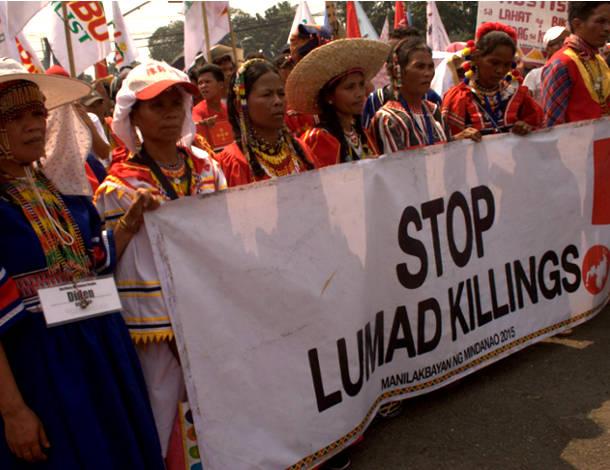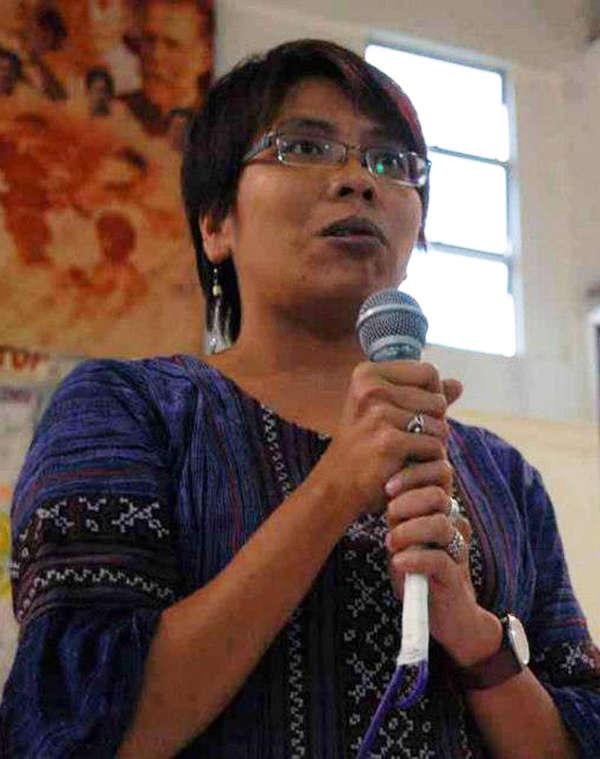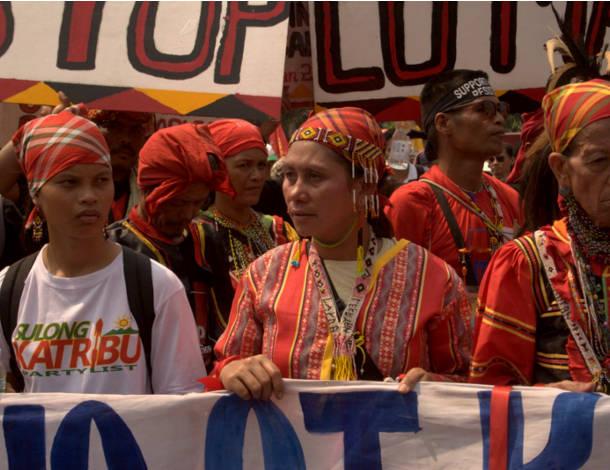The Philippines, and more specifically Mindanao, the second largest and southernmost major island, rich in natural resources and minerals, is being plundered by trans- and multi-national companies carrying out extractive operations with impunity for the human rights violations they commit.1 The government of the Philippines provides the paramilitary forces to suppress and eliminate members of the Lumad2 communities in Mindanao if they confront the government’s neoliberal agenda and trans- and multi-national companies.

The Lumad have inhabited Mindanao for hundreds of years, developing customs and practices unique and necessary for their survival. They refuse to leave their land and are committed in the fight to protect their ancestral land and resources.
Women of Lumad communities are taking the lead in organizing resistance and defending their communities, while confronting numerous gender-specific challenges in carrying out human rights advocacy against collusion of private businesses and government interests.
AWID spoke to Cristina Palabay, a WHRD from Karapatan, about why human rights struggles in the Philippines are stronger than ever, while facing momentous challenges at the same time.
AWID: What is the current state of the human rights struggle in the Philippines from the perspective of a WHRD?

Cristina Palabay (CP): The human rights situation in the Philippines is getting worse. Karapatan documented numerous horrendous attacks against human rights defenders under the current administration of Benigno Aquino III.
Politically motivated extrajudicial killings have increased in Mindanao, especially among the indigenous population. From July 2010 to September 30, 2015, Karapatan documented 294 extrajudicial killings and 27 enforced disappearances. In addition, 172 individuals were tortured and 911 were arbitrarily arrested and detained, mostly based on trumped up charges. Karapatan also documented more than 65,000 individuals who were forcibly evicted and 15 massacres occurred due to indigenous communities’ defending their lives and communities. While analysing the pattern of these killings, we see that many of the incidents were perpetrated by the paramilitary forces, under the command of the Armed Forces of the Philippines and “Investment Defense Forces” defending extractive companies
Another worrisome pattern is the criminalization of human rights work, advocacy and political activism. These are fundamental rights people of the Philippines are entitled to by our own Constitution and the international treaties to which our government is signatory. The biggest threat we face in our human rights work is the government’s counter-insurgency program - Oplan Bayanihan - which has resulted in numerous atrocities by the paramilitary and Armed Forces of the Philippines (AFP). Oplan Bayanihan is designed to eliminate anyone who poses a threat to the Philippine government’s neoliberal agenda, and highly profitable extractive operations of trans- and multi-national companies. Within the framework of this operational plan, anyone opposing undemocratic, neoliberal and misogynistic government policies are considered “enemies of the state”.
AWID: What role do paramilitary forces play in the killings of Lumad?
CP: The paramilitary forces are pawns of the State security forces, to divide and rule the Lumad communities, and to disempower them using brutal State repression. Some members of the paramilitary forces are recruited from indigenous communities in an attempt to break the strong ties between indigenous communities in Mindanao.
The paramilitary forces seem to have unquestionable power to evict and attack the Lumad in Mindanao, if it suits the interest of the governments and big trans-or multi-national companies. We have been shocked and appalled by the massacre of three our brothers Emerito Samarca, Dionel Campos and Bello Sinzo on 1 September 2015. We believe that they were targeted because of their leadership in the struggle of the indigenous communities for their rights and dignity.
There has not been one case where members of the paramilitary forces were convicted and held fully accountable for the harassment, intimidation or murder of the Lumad.
AWID: How do murders of Lumad affect the struggle for peace, justice and human rights in the Philippines?
CP: We grieve every time the report of a massacre reaches us. However, with grief comes the feeling of rage, determination and persevering courage to continue what these human rights defenders stood and fought for. Our communities feel more determined than ever to pursue justice and genuine, lasting peace. Despite all the massacres and intimidation, the Lumad are still committed to defending their history, land, and livelihood. We should therefore be humbled and inspired by their courage and to commitment.
The massacre of our fellow human rights defenders Emerito Samarca, Dionel Campos and Juvello Sinzo, has made it evident that the murders are targeted. They were active members of the people’s movement in Mindanao.
AWID: What are some gendered aspects of the human rights struggle in the Philippines?
CP: State security forces employ specific forms of gender-based violence, including harassment and rape, to silence the grassroots, widespread and strong people’s movement, where women take the lead in shaping the resistance.
For example, Bai Josephine Pagalan, is a committed Lumad woman leader and WHRD involved in mobilizing resistance in the Caraga region in Mindanao. It was in front of Bai Josephine’s house where her fellow Lumad leaders Dionel Campos and Juvello Sinzo were mercilessly killed while all members of their community including children witnessed.
After killing Campos, Sinzo and Samarca, the paramilitary forces told the residents they should all leave their land, and threatened to kill them if they disobeyed. Bai Josephine, her daughter and newborn baby, and the rest of the community were forcibly evacuated the morning of September 1. Deprived of the time and space to mourn their loss, they walked for more than eight hours to Tandag City, where they are still staying.

Members of the Lumad community and activists tell of explicit cases of sexual harassment and gender based violence including rape committed by para military forces and security forces of the state. It is a matter of concern that such cases are not thoroughly investigated. Instead, on top of attacks against their land, territory, history, Lumad communities are subject to added layers of gender based discrimination and violence.
AWID: What is the role of WHRDs in Mindanao in advocating for the rights of Lumad and what are some strategies they have developed to defend their land, territory and lives?
CP: We are humbled and inspired by the courage, leadership and perseverance of the women human rights defenders in Mindanao, especially the Lumad women. They are at the forefront of the struggles, and advocate for their communities. WHRDs lead organizations, work as volunteer teachers in the alternative schools for the Lumad, organize and mobilize women and other members of the community to defend the land and their lives.
WHRDs in Mindanao receive political education within their own communities and are empowered through their engagement in political struggles. They now lead many organizations defending land, life and their communities. WHRDs in Mindanao undertake responsibilities and receive recognition equal to their male colleagues. Some WHRDs have also assumed leadership roles when their husband or a loved one is killed.
AWID: How can the international human rights community support your #StopLumadKillings campaign?
CP: There are concrete steps the international community can take to support our struggle in the Philippines. Currently, there are official requests from the Special Rapporteur on rights of indigenous peoples and Special Rapporteur on HRDs to conduct country visits to the Philippines. The Philippine government has been unresponsive to the requests of SRs who have the mandate to conduct independent investigations and analysis of the severity of human rights violations in the Philippines. Organizations, individuals, institutions and members of the international community can write appeals to amplify this request at the international level, and call on the government of the Philippines to abide by its international obligations.
We urge the international community to keep up the pressure to hold the government of the Philippines accountable for the extrajudicial killings, harassment, criminalization and illegal arrests of human rights and political activists; and for depriving Lumad people of access to their land and livelihood. During these difficult times, let us show once again how international solidarity can support the resistance and struggle of the Lumad and the Filipino peoples.
We are also appealing for humanitarian aid for the nearly 5,000 Lumad in Mindanao who are in evacuation centers because they are unable to go back to their communities due to the continuing military operations.
